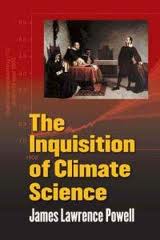Book review: The Inquisition of Climate Science
Posted on 8 October 2011 by John Cook
 During the sixteenth century, the Catholic Church persecuted Galileo for espousing the view that the Sun, not the Earth, lies at the centre of the solar system. In modern times, climate scientists are being subjected to a similar inquisition, waged by those who deny the science. The persecution of climate scientists and of science itself is thoroughly documented in a new book, The Inquisition of Climate Science, by former Reed College president and National Science Board member James Powell.
During the sixteenth century, the Catholic Church persecuted Galileo for espousing the view that the Sun, not the Earth, lies at the centre of the solar system. In modern times, climate scientists are being subjected to a similar inquisition, waged by those who deny the science. The persecution of climate scientists and of science itself is thoroughly documented in a new book, The Inquisition of Climate Science, by former Reed College president and National Science Board member James Powell.
Climate scientists, like Galileo, turn to empirical evidence and the scientific method as the basis of our understanding of how the world works. In contrast, climate "skeptics", conservative think tanks, ideologues and the fossil fuel industry now play the role of the "establishment", waging a war on science. Powell's book documents the industry of denial and their many prongs of attack on climate science:
-
A small group of scientists who regularly appear at conferences, media interviews, in book lists and on think tank advisory lists.
-
The fossil fuel industry, who have poured millions of dollars into PR campaigns to confuse the public. Over 8 years, the most profitable company in history, Exxon Mobil, gave $16 million to think tanks that deny global warming science. Fossil fuel companies also give millions of dollars to politicians such as Joe Barton and James Inhofe, who vehemently oppose climate action.
-
Prominent non-scientists such as the conservative columnist George Will, the late science-fiction author Michael Crichton and Christopher Monckton (trained in journalism and the classics).
-
Conservative think tanks, adopting lofty names like "Africa Fighting Malaria" while arguing against climate action. These think tanks receive millions of dollars from fossil fuel companies like Exxon Mobil.
-
Prominent public figures such as Sarah Palin who characterise climate science as "snake oil science" while Senator James Inhofe describes global warming as the "greatest hoax ever perpetrated on the American people". Inhofe and Virginian attorney general Ken Cuccinelli have attempted to take climate scientists to trial.
-
Even the mainstream media have unwittingly contributed to the chorus by granting the same few climate misinformers an equal voice with the overwhelming scientific consensus.
However, Powell points out one distinction between the Roman Inquisition and the modern day Climate Inquisition. At least the Roman inquisitors had an alternative theory - Ptolemy's 2nd Century theory of Earth-centered astronomy. The Climate Inquisition have no alternative theory that can explain the many lines of evidence that point to human caused global warming.
The persecution of Galileo is highly instructive in putting today's climate controversy in proper context. The Inquisition Of Climate Science, available in hard cover and as an e-book that can be read on Kindle, iPad and computer, is a must-read for anyone who wishes to understand the full scope of the denial industry and their modern day persecution of climate science.
Note: SkS have also reviewed James Powell's books 2084: An Oral History of the Great Warming and Rough Winds: Extreme Weather and Climate Change.































 Arguments
Arguments






























The case for AGW would be stronger if the proponents were more receptive to telling the public about the range of uncertainties and deficiencies of knowledge which accompany the science.[DB] "thoughtful skeptic gets labelled and pilloried with the likes of ignorant populist creations like Sarah Palin and Rick Perry"
The "thoughtful skeptic" seems to be a truly rare creature then. If you have actual examples of such happening by any here please give a link to them.
Unsubstantiated allegations of impropriety struck out. You must of missed those many thousands of instances of uncertainties being detailed in every chapter & verse of the various iterations of the IPCC.
For example, in the IPCC AR4, WG1, the words, "uncertain," "uncertainty" or "uncertainties" occur 1,372 times.
unclosed tag fixed
(DB) Thanks for indirectly teaching me a new word: tergiversate.
[DB] Inflammatory snipped.
[DB] Try here:
http://www.skepticalscience.com/news.php?n=441#31068